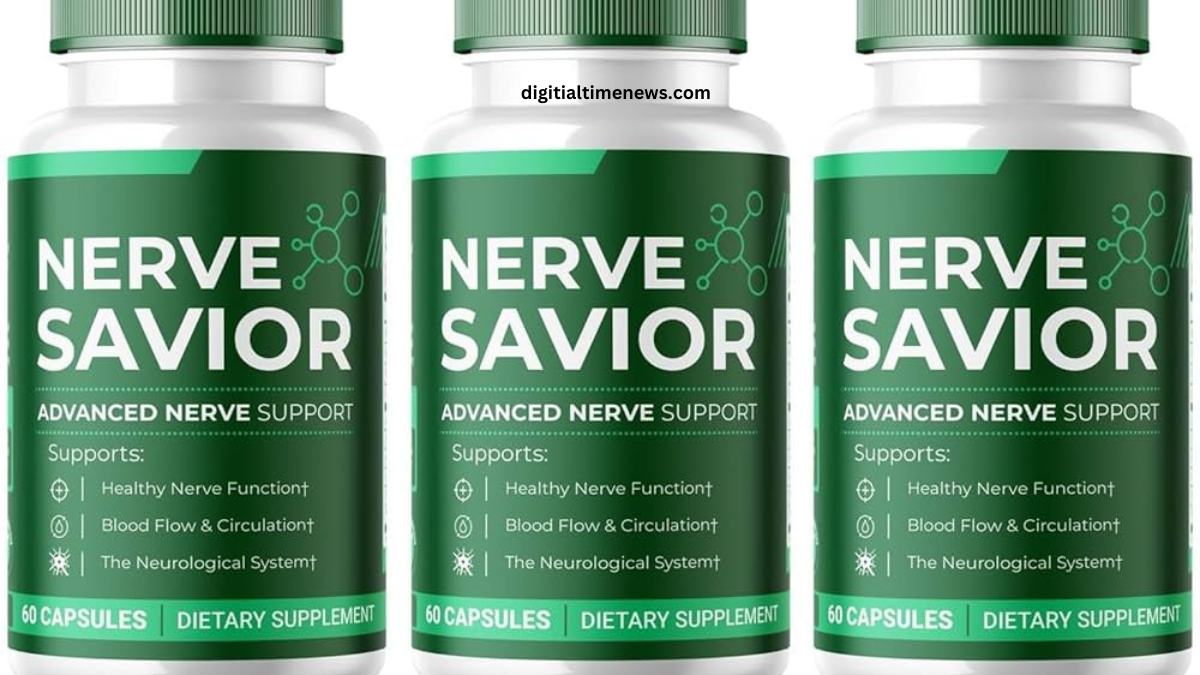nerve savior health is often overlooked in discussions about overall well-being, but it’s crucial for a healthy, active lifestyle. One term that’s been gaining traction in the wellness community is “nerve savior.” This concept revolves around protecting and enhancing nerve function, which can be key in preventing various health issues, including neuropathy and chronic pain. In this article, we’ll explore what a nerve savior is, why it matters, and practical steps to support your nerve health nerve savior.
Understanding Nerve Function

nerve savior play a vital role in how our bodies communicate internally. They are responsible for transmitting signals from our brain to different parts of the body, allowing us to move, feel, and react to our environment. The nervous system is divided into two main parts: the central nervous system (CNS) and the peripheral nervous system (PNS). The CNS consists of the brain and spinal cord, while the PNS includes all other nerves that extend throughout the body nerve savior.
When we talk about nerve function, we’re referring to how well these systems work together. Healthy nerves can efficiently relay messages, which is essential for everything from muscle coordination to sensory perception. A malfunction in this communication can lead to various issues, ranging from mild tingling sensations to debilitating pain. This is where the idea of a “nerve savior” comes into play, emphasizing the importance of maintaining optimal nerve health nerve savior.
The Importance of Nerve Health
Maintaining nerve health is crucial for overall well-being. When nerves are damaged or not functioning correctly, it can lead to a host of issues, including neuropathy, which often manifests as numbness, tingling, or sharp pain. This condition can severely impact one’s quality of life, making everyday tasks feel insurmountable nerve savior.
Moreover, nerve health is closely tied to other bodily functions. For instance, impaired nerve function can affect your mood and cognitive abilities, as the brain relies on effective nerve signaling to process emotions and thoughts. By focusing on nerve health, you not only mitigate risks associated with nerve damage but also promote better mental and emotional health.
What Makes a Nerve Savior?
So, what exactly constitutes a “nerve savior”? It’s a combination of lifestyle choices, dietary habits, and sometimes, supplementation aimed at supporting nerve function. The goal is to enhance the body’s natural ability to protect and repair nerve tissues. This can involve a mix of physical activity, nutritional adjustments, and mindfulness practices.
One of the foundational elements of being a nerve savior is understanding your body’s needs. Different individuals may have varying requirements based on factors such as age, lifestyle, and existing health conditions. Recognizing these unique needs is the first step toward creating a personalized approach to nerve health.
Nutritional Support for Nerve Health
Diet plays an integral role in maintaining nerve health. Certain vitamins and minerals are particularly beneficial for nerve function. For instance, B vitamins, especially B12, are essential for the maintenance of the nervous system. They help in the production of myelin, a protective sheath that covers nerves. Deficiencies in these vitamins can lead to nerve damage, making it vital to include them in your diet.
Incorporating foods rich in antioxidants can also be a game-changer. Antioxidants help combat oxidative stress, which can damage nerve cells. Foods like berries, dark chocolate, and green leafy vegetables are packed with antioxidants and should be staples in a nerve-supportive diet. Additionally, healthy fats, particularly omega-3 fatty acids found in fish, nuts, and seeds, are known to promote nerve regeneration and overall brain health.
Lifestyle Choices Impacting Nerve Health
Beyond diet, lifestyle choices significantly impact nerve health. Regular exercise is one of the most effective ways to support nerve function. Physical activity enhances blood circulation, ensuring that nutrients reach nerve tissues effectively. It also helps in reducing inflammation, which can contribute to nerve pain.
Moreover, managing stress is crucial for maintaining nerve health. Chronic stress can lead to heightened levels of cortisol, a hormone that can negatively affect nerve function. Practices such as yoga, meditation, and deep breathing exercises can help mitigate stress levels, promoting a healthier nerve environment. Creating a balanced lifestyle that incorporates physical activity, mindfulness, and healthy eating is key to being your own nerve savior.
Supplements That Support Nerve Health
While a balanced diet and healthy lifestyle are fundamental, sometimes supplements can provide an extra boost. Several supplements have been shown to support nerve health effectively. Alpha-lipoic acid, for instance, is an antioxidant that has been researched for its ability to improve nerve function in diabetic patients.
Another noteworthy supplement is acetyl-L-carnitine, which has been linked to nerve regeneration and improved nerve function. Omega-3 fatty acids, which can also be consumed as fish oil supplements, are excellent for reducing inflammation and promoting nerve repair. However, it’s essential to consult a healthcare professional before starting any new supplements, especially if you have pre-existing conditions or are taking other medications.
The Role of Hydration
One often underestimated aspect of nerve health is hydration. Water is essential for every cell in the body, including nerve cells. Proper hydration helps maintain optimal nerve function by ensuring that nutrients are effectively transported and waste products are efficiently removed.
Dehydration can lead to reduced nerve function, manifesting as fatigue, headaches, or even mood swings. Aim for at least eight glasses of water a day, and consider your activity level and environmental conditions. Staying hydrated is a simple yet effective way to be your nerve savior.
The Connection Between Sleep and Nerve Health
Sleep is another crucial factor that impacts nerve health. During sleep, the body engages in repair processes, including those for nerve tissues. Poor sleep quality can lead to a myriad of issues, including impaired cognitive function and increased sensitivity to pain.
Prioritizing good sleep hygiene can make a significant difference. Establishing a regular sleep schedule, creating a calming bedtime routine, and ensuring a comfortable sleep environment can all contribute to better sleep quality. When you sleep well, your body has the time it needs to rejuvenate, allowing your nerves to function optimally.
Stress Management Techniques
As mentioned earlier, stress can have detrimental effects on nerve health. Managing stress effectively is vital for being a nerve savior. Mindfulness techniques, such as meditation and deep breathing, can help calm the mind and body, making it easier to navigate life’s challenges without overwhelming stress.
Incorporating activities that you enjoy, such as reading, gardening, or painting, can also serve as excellent stress relievers. Finding time to relax and engage in hobbies not only brings joy but also provides a necessary mental break. Establishing a routine that includes regular downtime can significantly enhance your nerve health and overall well-being.
The Impact of Smoking and Alcohol
Lifestyle choices like smoking and excessive alcohol consumption can hurt nerve health. Smoking reduces blood flow and can damage blood vessels, hindering the delivery of essential nutrients to nerve tissues. On the other hand, excessive alcohol intake can lead to a condition known as alcoholic neuropathy, characterized by nerve damage due to chronic alcohol consumption.
Reducing or eliminating these habits can greatly improve nerve health. If you’re struggling with smoking or alcohol use, consider seeking professional help or support groups. Making these changes can be challenging, but the benefits to your nerve health and overall well-being are well worth the effort.
Recognizing Signs of Nerve Damage
Being aware of the signs of nerve damage is crucial for early intervention. Common symptoms include numbness, tingling, burning sensations, and muscle weakness. If you experience these symptoms, it’s essential to consult a healthcare professional for evaluation.
Ignoring these signs can lead to more severe complications. Early diagnosis and treatment can make a significant difference in outcomes, helping to prevent further nerve damage and improve quality of life. Remember, your nerves are crucial for your body’s communication system, so taking these signs seriously is a vital part of being a nerve savior.
Creating a Nerve-Supportive Environment
Your environment can also play a role in nerve health. Creating a space that promotes relaxation and reduces stress can be beneficial. This might involve decluttering your living area, introducing calming scents like lavender, or incorporating soothing colors into your decor.
Additionally, consider ergonomics in your workspace. Poor posture or inadequate seating can lead to nerve compression and discomfort. Investing in ergonomic furniture and taking regular breaks can enhance your comfort and protect your nerves from unnecessary strain.
The Importance of Regular Check-ups
Regular medical check-ups can help monitor your nerve health. Conditions like diabetes, which can lead to peripheral neuropathy, often go unnoticed until significant damage has occurred. Regular blood tests and consultations with healthcare providers can help catch potential issues early.
Moreover, don’t hesitate to seek advice if you have concerns about your nerve health. Specialists such as neurologists can provide insights and treatment options that may not be available through general practitioners. Staying proactive about your health is a key component of being a nerve savior.
The Power of Community Support
Being part of a supportive community can also aid in maintaining nerve health. Engaging with others who share similar health goals can provide motivation and accountability. Whether it’s a local exercise group, a cooking class focused on healthy eating, or an online forum for those dealing with nerve issues, connecting with others can offer encouragement and shared wisdom.
Additionally, sharing your journey can be therapeutic. Speaking about your experiences can help others while also allowing you to process your challenges. Community support plays a significant role in mental and emotional health, which is closely tied to nerve health.
Mind-Body Practices for Nerve Health
Incorporating mind-body practices like yoga, tai chi, or qigong can be incredibly beneficial for nerve health. These practices not only enhance physical fitness but also promote relaxation and stress relief. The gentle movements and mindfulness involved in these exercises can improve circulation and enhance nerve function.




